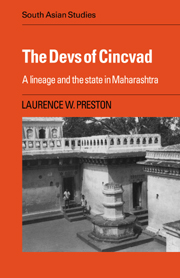Book contents
- Frontmatter
- Contents
- List of figures and tables
- Preface
- List of abbreviations and note on Indian technical usages
- Introduction: an inamdar lineage in Indian history
- PART ONE THE INAMDAR UNDER THE MARATHAS
- PART TWO THE INAMDAR UNDER THE BRITISH
- 3 Introduction to Part Two
- 4 From ritual grandee to state pensioner: varsasans and the Morgav pilgrimage
- 5 An inamdar's domain: Cincvad and the commerce of Pune-Haveli
- 6 The genesis and operation of the Inam Commission
- 7 Claiming an inheritance: the Inam Commission and the Cincvad Samsthan
- 8 Conclusion: an inamdar's rights and the authority of the state
- Bibliography
- Index
- CAMBRIDGE SOUTH ASIAN STUDIES
6 - The genesis and operation of the Inam Commission
from PART TWO - THE INAMDAR UNDER THE BRITISH
Published online by Cambridge University Press: 05 November 2011
- Frontmatter
- Contents
- List of figures and tables
- Preface
- List of abbreviations and note on Indian technical usages
- Introduction: an inamdar lineage in Indian history
- PART ONE THE INAMDAR UNDER THE MARATHAS
- PART TWO THE INAMDAR UNDER THE BRITISH
- 3 Introduction to Part Two
- 4 From ritual grandee to state pensioner: varsasans and the Morgav pilgrimage
- 5 An inamdar's domain: Cincvad and the commerce of Pune-Haveli
- 6 The genesis and operation of the Inam Commission
- 7 Claiming an inheritance: the Inam Commission and the Cincvad Samsthan
- 8 Conclusion: an inamdar's rights and the authority of the state
- Bibliography
- Index
- CAMBRIDGE SOUTH ASIAN STUDIES
Summary
Notwithstanding the momentous political changes in India in the 1850s, nor even a military rebellion, the Inam Commission, whether under the East India Company or the Crown, labored to apply revenue policy to the multitude of individual cases that faced it. Policy was vigorously implemented without heed for considerable and vocal dissent. Having by the mid-1860s settled most of the major claims to inam lands in British districts, the commission accomplished what was intended. But it would be fallacious to assume that the day-to-day inquiries of the commission were purely mechanical settlements – claims considered and an act of government enforced. In many ways, each case was a vital struggle between the state and inamdar.
The commission believed the British to be the legitimate successors of the Marathas. The Company had therefore inherited the authority to regulate state grants as it saw fit. The commission asserted that the preconquest Marathi documents would show how inam was managed under the Marathas. Furthermore, the documents contained indisputable written evidence of the terms by which the state granted inam. In short, the commission was confident it could settle the rights of the state's privileged subjects solely by looking at the physical record. Much of the commission's evidence has here been described in the first part of this study. Inevitably, in examining the alienation inquiries of the 1850s, some retrospective analysis of the Marathi sources is necessary.
- Type
- Chapter
- Information
- The Devs of CincvadA Lineage and the State in Maharashtra, pp. 162 - 194Publisher: Cambridge University PressPrint publication year: 1989

